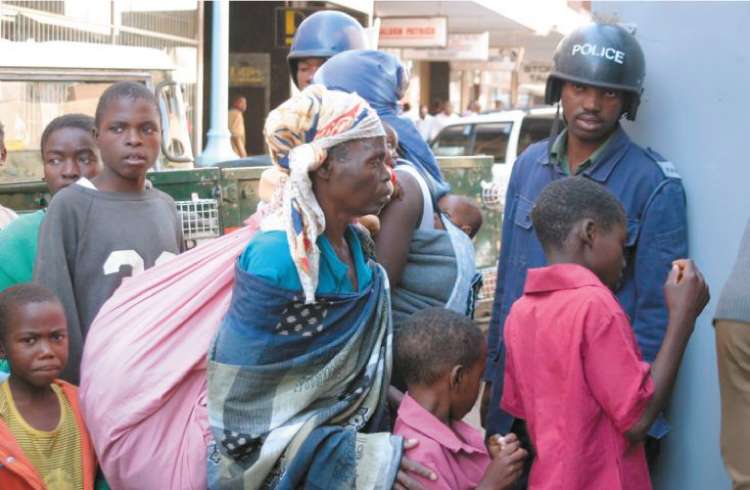Tsvangirai seeks embassy refuge after death threat

Morgan Tsvangirai has sought refuge at the Dutch embassy in Harare after receiving an "umpteenth threat on his life", his party said, as Robert Mugabe vowed to proceed with next Friday's presidential run-off despite his chief opponent's withdrawal.
It seems the opposition leader's decision on Sunday not to contest Mr Mugabe in the run-off was not enough to persuade the President to ease his reign of terror against the opposition. Yesterday, heavily armed police raided Mr Tsvangirai's Movement for Democratic Change head office, Harvest House, in Harare and seized 60 mainly displaced victims of political violence who were being housed there.
Mr Mugabe's Zimbabwe Electoral Commission (ZEC), meanwhile, announced that it would proceed with Friday's second-round ballot despite Mr Tsvangirai's withdrawal.
"If an election can be held in Iraq, surely it can also be held in Zimbabwe," said high court Judge George Chiweshe, a well-known Mugabe aide who chairs the ZEC. "I don't believe the level of violence in the country is such that a credible election is impossible. We don't have a war. We will be able to hold credible elections."
Judge Chiweshe said he had not received any communication in writing about Mr Tsvangirai's withdrawal and was therefore proceeding with the election on Friday. Mr Mugabe's spokesman, George Charamba told reporters that Mr Mugabe was continuing with his electoral campaign programme and the run-off would proceed despite Mr Tsvangirai's withdrawal remarks.
Speaking of Mr Tsvangirai's withdrawal, Mr Charamba said: "It is just an MDC media agenda that is calculated at hoodwinking Zanu-PF supporters into believing that there will be no elections. But, of course, they are fooling themselves as the party's supporters are going to vote on 27 June."
He added that Mr Mugabe was busy campaigning in eastern Zimbabwe yesterday. Dutch officials confirmed that Mr Tsvangirai had taken refuge at their embassy in Harare. A request to host him at the embassy premises for safety reasons had been sought and granted, said a Dutch Foreign Ministry spokesman Bart Rijs. "He (Tsvangirai) is currently reflecting on what the next step should be," Mr Rijs said, without indicating when Mr Tsvangirai would leave the embassy compound.
Zimbabwe's police chief, Augustine Chihuri, a close Mugabe ally within the powerful Joint Operations Command whose generals are seen as a key obstacle towards a negotiated solution, described Mr Tsvangirai's decision to seek Dutch help as "an exhibitionist antic ... intended to provoke international anger".
"We, at the same time, ask the Dutch embassy, if indeed he is there, to tell him to go home and enjoy [his] sleep and nothing will happen to him," said Mr Chihuri. Mr Tsvangirai has survived three assassination attempts at the hands of Mr Mugabe's thugs.
MDC spokesman Nelson Chamisa said Mugabe's terror campaign showed no sign of relenting after yesterday's raid on the MDC's head office. But a police spokesman, Wayne Bvudzijena, said the police had only visited the head office to remove people living in unhygienic conditions in the MDC building meant for office space and not residential accommodation. "Since when have they started caring about our supporters when they have in fact been killing them in their dozens?" asked Mr Chamisa. "If the regime is worried about their hygiene, then why arrest then and take them to notoriously filthy prisons."
Mr Tsvangirai repeated yesterday that he was prepared to negotiate with Zanu-PF to end the crisis in Zimbabwe but only if the violence against his supporters was halted. The MDC has reported at least 96 deaths among its supporters since the 29 March election in which Mr Tsvangirai finished ahead of Mr Mugabe but failed to win an outright majority according to the official results.
He has said he is prepared to negotiate on a "transitional authority" to see Zimbabwe organise a credible presidential election and stabilise the country, but would not join a permanent unity government with Mr Mugabe.
The ZEC said that if it did receive Mr Tsvangirai's withdrawal in writing, they would be legally empowered to declare the sole remaining candidate the winner of the election.
What are the options?
* Sanctions
Expansion of EU sanctions against Mr Mugabe and his inner circle appears to be the most promising route, as the UN Security Council remains too divided to take any global action. The EU already has an assets freeze and travel ban against Mr Mugabe and 129 of his closest aides. Britain is pushing for the children of regime members to be banned from studying in the EU (a similar measure was brought in by Australia in 2002). Unilateral action by Britain is unlikely.
*National unity government
Zimbabwe opposition and government remain far apart on the definition of a national unity government. Morgan Tsvangirai has repeated an offer of talks with the ruling Zanu-PF party for a "soft landing" but he rules out a government led by President Mugabe.
*Electricity cut-off
International companies are being pressured to stop trading with Zimbabwe, but only so long as the measures would not hurt the poor. This means that calls for South Africa to cut off electricity supplies to Zimbabwe are likely to go unheeded.
*Military action
Totally ruled out.
Join our commenting forum
Join thought-provoking conversations, follow other Independent readers and see their replies
Comments
Bookmark popover
Removed from bookmarks